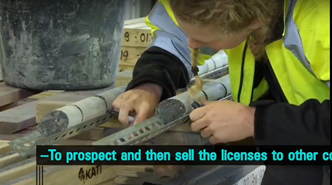A passion for nature, and a curiosity about exploration: my early career in geology
- Get into Geoscience

- Jan 12, 2021
- 3 min read
By Evie Burton

I got into geoscience by following my passion of exploration. When I was younger, I was lucky enough to be taken on holidays skiing, mountain biking or scuba diving, exploring different landscapes. I remember one scuba diving holiday to Egypt I was looking at the mountains in the distance and I asked my Grandpa how they got there. Using a lot of hand waving my grandpa was able to explain to me how there are large tectonic plates that move around the earth and very slowly as they collide they create mountains. After this I was hooked into wanting to know more about the natural world. At school I enjoyed geography and decided to pursue this further at university. I went to a university in Scotland where they encourage you to take 3 subjects in first year. I decided to take geology, a subject I hadn’t been exposed to before, geography and French. I immediately found geology both challenging and intriguing, not just recognising that rock formations could be seen at the Earth’s surface but also understanding why they are there and how processes that take place deep below the earth’s crust could explain the formation.
In my second year at university, I met an exchange student at my sports club that had come over from Australia, she explained to me that her dad was a consulting geochemist and before I knew it I was flying over to Perth! A consulting geochemist is someone who advises businesses about chemical aspects of geology. I spent 3 months in the outback in Australia learning more about exploration geology. Exploration geologists use a multitude of techniques (geophysical – using physical techniques to examine what’s under the ground without doing any digging, geochemical – understanding the chemistry of rocks, structural – the folds and faults that run through the Earth’s crust and observational – observing the land around you) to map and assess whether a particular area of land may contain minerals that can be mined. My job was to help scan rocks using different pieces of equipment to try and target minerals that had metals (e.g. lithium) in them that could be mined and used in batteries in the future. Lithium is one of the most important metals we need to secure a sustainable future for our planet! These were some of the most beautiful rocks I had ever seen.
From left to right, A beautiful Lithium bearing pegmatite, using different pieces of geochemical equipment in a core shed, standing in the bucket of a mining differ to show the scale! And a typical exploration site in the outback with driller and bags of samples.
Shortly after I graduated university, I was told that an applied geoscience conference would be held in Glasgow. A conference is where lots of professional people get together to share knowledge about the field they work in and make connections with each other. I decided to volunteer for the conference as I thought it may give me the opportunity to introduce myself to people in the geoscience industry. I was hoping to get some experience so that I could figure out where I next wanted to go in my career. I managed to get TWO jobs out of this conference, and lots of connections. On the back of this I spent 3 months working in Sweden and Norway exploring for metals such as gold and nickel. Whilst out there I featured on a Swedish television programme which looked at mining in the country.
From left to right: Orientating a drillcore on national television, soil sampling in Sweden - messy but important work!, every night was another beautiful sunset.
I then got a job as an associate researcher in iCRAG, the Irish Centre for Research in Applied Geosciences, where I am now. This position allows me to use my experience in the exploration geology industry, whilst working alongside academic researchers. Together we are working to understand the mining industry and help to make it more sustainable.
My advice to anyone going into geoscience is:
- Follow the subjects that you find interesting and enjoy, you’ll probably end up in a career that you love.
- Never turn down an opportunity to meet people, you never know what you might learn and which country you’ll end up in next.
- Ask lots of questions, its okay if you feel like you don’t know something – I have felt out of my depth at every new place I have gone to- but after asking questions and getting stuck in its amazing how quickly you’ll learn new things.
















Comments